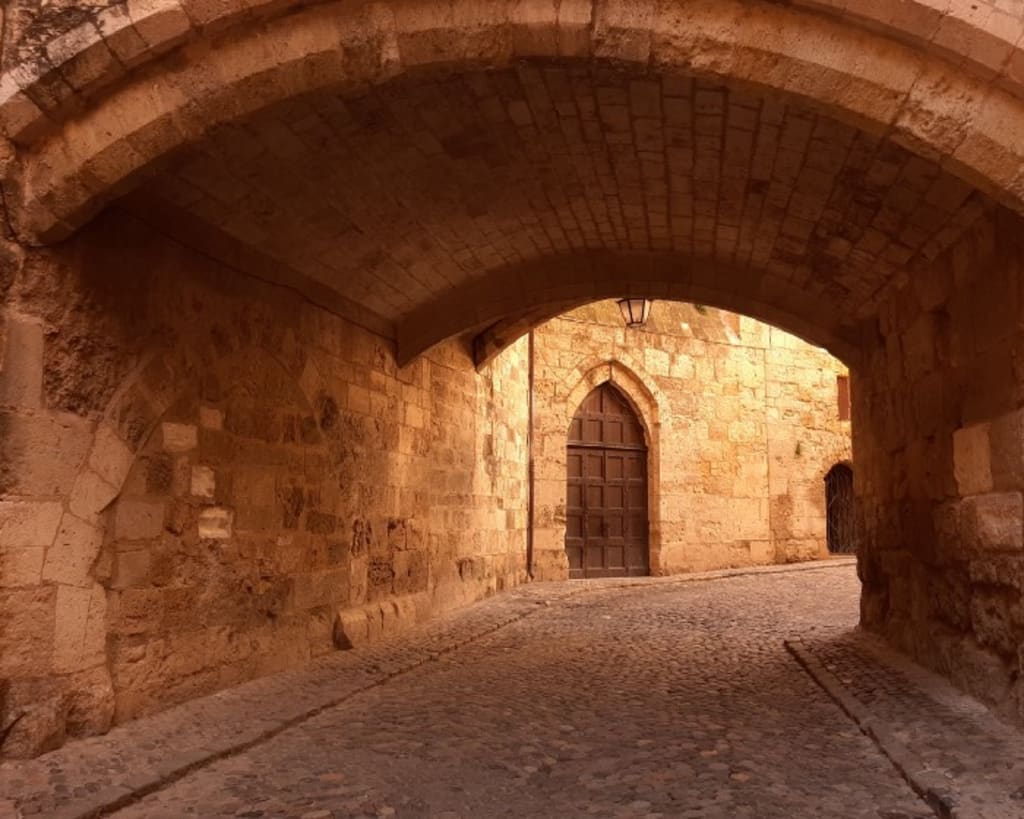Next Time, Leave Your Camera — and Your Judgments — at Home
Narcissists in Narbonne

A year and a month ago, we were in Narbonne
A coastal town in the south of France, sixty miles from the border with Spain. In 118 BC, it was home to retired Roman legionaries. Next, Narbonne was conquered by the Moors, who were later supplanted by a Jewish principality that lasted through the Middle Ages.
And in the cathedral, started in the thirteenth century and never completed, I felt nervous. I watched the precipitous lean caused by a worn-down stiletto heel as an exquisitely-dressed couple wandered through the church. The soles of her battered shoes were red as pope’s blood, and she leaned like an unfinished spire as she whispered to her partner in velvet French.
Don’t think I’m anti-vanity. Looking good in public is as much a question of good manners as it is a matter of personal style. Even if it’s etiquette I’ve never personally mastered. I admire a commitment to looking good, though the thought of rolled ankles makes me sympathetically sick. Anyway, my wife wears sneakers.
Outside, in the ancient cloister, a rectangle of azure sky showed between medieval spires. A young man sat on a low wall, half-shaved, gazing dreamily into the distance while his girlfriend snapped a photo. She showed it to him. He shook his head and struck another pose. The camera clicked again.
Call me un chauvin, but I find physical vanity more permissible in women than in men. After all, women are more willing to suffer for beauty. Maybe some last vestige of the same cracked Catholicism that raised the cathedral almost to the sky makes me admire suffering.
I give points for effort. It takes admirable ovaries to risk high heels on cracked cobblestones. Anyone can throw on some ripped jeans and running shoes and a pout.
It’s easy to laugh
Go to any beach in the world and look at the row of Instagram boyfriends holding phones to capture pictures of their self-absorbed girlfriends. Once, when the walls of Narbonne were still sticky with fresh paint, women looked for a husband with some land and not too much of a temper. My grandfather caught my grandmother’s eye by lifting more crates of ammunition in the factory where they met than any other man.
On the night we met, my wife was charmed by my accent. I liked her rack. Tres, tres chauvin.
But if they are not already, modern girls may soon start looking for a guy who can hold the camera steady. One who understands lighting and timing and the golden ratio. A partner who reflects on them in the same way as the clothes they wear. The relationship as performance.
And maybe I’m old-fashioned, a prisoner of the values of a fading world. Still waving a tattered flag that fewer people recognize each year. Maybe, if the preening pretty boy in the cloisters of the cathedral is representative of his generation, the boys now just want their picture taken too.
Every photo you take is a barrier between yourself and the world
To capture an experience is in some measure to not experience it. The viewfinder of the camera or the screen of your phone rips you out of the moment, projecting your swollen shadow forward into the future to look back at the present from some hazy, as-yet-undiscovered vantage point. It’s enough to give you a species of vertigo, caused by time, not space.
We seek an authentic experience, then document it to death with flashing cameras and boastful blog posts and, the dark god of commerce help us, books.
“Pleasure takes us away from ourselves in the same way as distraction, in Pascal’s use of the word, takes us away from God. Travel, which is like a greater and a graver science, brings us back to ourselves.” — Albert Camus
Travel is a pleasure
At least to me. Even the scowling security staff and the virus-laden planes impregnated with other people’s farts haven’t changed that. But Camus was right about travel bringing us back to ourselves. Our real selves, that is.
Stripped of our ordinary habits and familiar surroundings, we have nothing left but our essential core. We can’t be our job or our social role or our circle of friends. We have to just be ourselves.
A new place peels back the layers of our lives like old wallpaper recoiling before hot steam and scraping blade. Like the ancient frescoes hidden in the closet of a budget hotel that was once a Renaissance palace.
Left wide open, we notice everything. The crooked wing of the pigeon in the square. A worn-down high heel. The pink blossoms sprouting in February along the banks of the gravy-colored canal.
“This is the most obvious benefit of travel. At that moment we are feverish but also porous, so that the slightest touch makes us quiver to the depths of our being. We come across a cascade of light, and there is eternity.” — Albert Camus
Now we travel forever with ourselves.
The invisible electronic connectome follows us everywhere, smiling glassily from dead-eyed screens in airport lounge and in train carriage, in cathedral and cloister.
In the open sky of the park, we don’t notice the poems carved into the flagstones we step on blindly. We travel with our shells on our backs, carrying the dead weight everywhere we go as it stands between us and the world. We’re not self-obsessed; we’re obsessed with fake selves. Our personal brand, a shuffling shibboleth breathing down the back of our necks everywhere we go.
Kids these days. It’s easy to say these things, to look with scorn on those tiresome Gen Zers who won’t go anywhere that doesn’t offer a Snapchat-worthy vista to make their life seem more glamorous than it is. But everyone thinks everyone else is traveling wrong.
Don’t blame the kids. If the technology existed when we were their age, we would’ve done the same. We do the same now, whipping out our phones instinctively at the sight of anything even slightly unusual. If we don’t record it, we can’t escape the faint feeling that it didn’t really happen.
Whether you record your experience with three dozen artfully arranged yet seemingly spontaneous selfies or with words as overly perfumed as a middle-aged madame being asked to leave the plane, it makes no difference. We want to preserve the moment even though we know moments can’t be preserved. Even though we know that’s their true magic.
Away from our screens, travel offers a practical way to achieve the experience the mystics longed for. The sudden and shocking contact with the eternal in a single moment, Camus’ quiver and Dickinson’s ecstatic experience.
It’s not just what travel is for. It’s what life is for.
I had to look up the quotes
But otherwise, these are the thoughts that flashed and died in my mind in the space of time it takes for the pupil to adjust from the cathedral’s gloom to the bright sun of a walled garden. We all judge on first sight. An evolutionary trick to keep us from petting friendly-seeming smilodons and adorable wolf puppies. And probably, we should put our phones aside a little more when we travel. But we should put our judgments aside too.
Over on the wall, the young couple had switched places. Now it was the girl lifting her chin and sucking in her stomach and pulling poses for indifferent followers, and her boyfriend taking the photos. In comfortable shoes, I walked up to them and offered to take a photo of the two of them together. They happily accepted.
Maybe it’s not the real thing. Maybe a photograph is a barrier between the world and us. But at the same time, it’s a portal. A tiny sliver of the eternal moment that can never compete with the real thing, but it’s still better than nothing.
Because another thing travel teaches you is that not everything has to be perfect. Sometimes, good enough is even better.
© Ryan Frawley 2021.
About the Creator
Ryan Frawley
Towers, Temples, Palaces: Essays From Europe out now!
Novelist, entomologist and cat owner. Ryan Frawley is the author of many articles and stories and one novel, Scar, available from online bookstores everywhere.






Comments
There are no comments for this story
Be the first to respond and start the conversation.